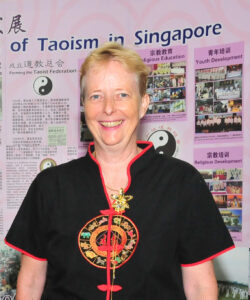Zuowang is a very rich Daoist term which will be our focus for this new series.
Zuowang:Sitting in oblivion. In later Daoism a technical term used to describe a state of deep trance or intense absorption, the notion of zuowang occurs first in the Zhuangzi, with the classical passage found in ch. 6: “I smash up my limbs and body, drive out perception and intellect, cast off form, do away with understanding, and make myself identical with the Great Thoroughfare”. The idea here as well as in the later tradition is a mental state of complete unknowing that involves a loss of personal identity and self and is the utter immersion in the nonbeing of the universe. (Daoism Handbook, pg. 46, edited by Livia Kohn)
Chinese zuòwàng compounds the words zuò 坐 “sit; take a seat” and wàng 忘 “forget; overlook; neglect”.
Chinese Meditation: Daoist and Buddhist
Sitting In Forgetfulness, Sitting in Oblivion (Zuowang) 坐忘
Guarding the One (Shouyi) 守一
Entering Stillness (Rujing) 入靜
Fasting the Heart-Mind (Xinzhai) 心齋
Quiet Sitting (Jingzuo) 靜坐
Circulating Qi (Xing Qi) 行氣
Inward Training (Neiye) 內業
The main resource utilized for this series is the text, Sitting in Oblivion-The Heart of Daoist Meditation, by Livia Kohn. She self-published it in 2010 via her own company, Three Pines Press. Livia is a practicing Daoist and is one of the most renowned scholars in Daoism itself.
What makes this book so useful is the fact that Kohn is a Westerner, a scholar and a practitioner. What this means is that she can write definitively about the practice using her own words and by making references to the modern Western cultural milieu. This makes the book far, far, far more intelligible than if she were a Chinese practitioner who had a hard time explaining herself to a Western audience. And as a practitioner, she understands exactly what is and is not important in the experience of “sitting and forgetting”, which is something that an academic without any grounding in the practice could not possibly do. (From the diary of a daoist hermit).
For our own purposes, this technique is right at home with Unborn Mind Zen in that it is apophatic (the unknowing factor) in scope and is quite effective in quieting the mind from all sensory outflows. This also brings to our attention the quotient of Mind-Fasting:
Unify your will and don’t listen with your ears but listen with your mind. No, don’t listen with your mind, but listen with your qi. Listening stops with the ears, the mind stops with matching [perception], but qi is empty and waits on all things. Dao gathers in emptiness alone. Emptiness is the fasting of the mind. (From the aforementioned text, pg. 25)
It’s also right at home with our series, The Vajrasamādhi Sutra, with the notion of guarding the One. In this sense it’s in league with Ch’an Buddhism itself.
While Zuowang is a fine technique for cultivating a proper Bodhi-flow, there are certain quandaries associated with it and an Unborn Mind adept needs to discern when such obstructing patterns emerge. As our series progresses these vulnerabilities will become self-evident and a proper remedy will be presented.
Enjoy!


